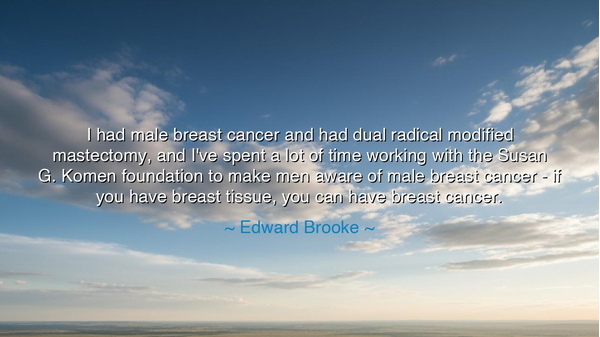
I had male breast cancer and had dual radical modified
I had male breast cancer and had dual radical modified mastectomy, and I've spent a lot of time working with the Susan G. Komen foundation to make men aware of male breast cancer - if you have breast tissue, you can have breast cancer.






Hear the courageous words of Edward Brooke, who declared with unflinching honesty: “I had male breast cancer and had dual radical modified mastectomy, and I’ve spent a lot of time working with the Susan G. Komen foundation to make men aware of male breast cancer—if you have breast tissue, you can have breast cancer.” At first, these words seem clinical, a report of survival. But beneath them lies a voice of defiance, of teaching, and of warning—a man who took his suffering and transformed it into a torch to light the way for others.
For in the world’s imagination, breast cancer had long been seen as a woman’s burden, a trial bound to femininity. Yet Brooke, a man of stature and renown, shattered that illusion by his very testimony. His words remind us that disease does not heed the boundaries of gender, nor bow to human preconceptions. Where there is flesh, there is frailty; where there is frailty, there is risk. And thus his declaration—“if you have breast tissue, you can have breast cancer”—resounds as both a truth and a warning, spoken not in theory but in blood.
This is the essence of wisdom: to take what is personal and reveal its universal meaning. Brooke did not speak only for himself, but for countless men who lived in silence, ignorant of their danger, or ashamed of their affliction. By joining with the Susan G. Komen foundation, he turned his private ordeal into a public cause. He knew that awareness saves lives, that ignorance kills silently. His words are not self-pity but a call to vigilance, to courage, to compassion.
The ancients would have understood this nobility. Consider Hippocrates, father of medicine, who urged that illness must be studied and spoken of openly, not hidden in shame. Or recall the tale of Job, who bore his suffering not as punishment, but as testimony of endurance. Brooke’s candor places him in this lineage: a man who did not hide his scars, but showed them so that others might be warned, and perhaps spared.
History, too, offers a parallel. When Magic Johnson declared in 1991 that he had HIV, he transformed the world’s perception of a disease shrouded in stigma. What had been whispered in fear was now spoken aloud, and through his courage, countless lives were touched, countless hearts awakened. So too with Brooke: by speaking of male breast cancer, he lifted the veil of silence, breaking down the prejudice that saw it as unmanly or impossible. His suffering became a message, his struggle a gift to others.
The teaching is clear: never assume immunity where the body is concerned, and never allow pride or prejudice to blind you to danger. Illness is no respecter of gender, of power, or of name. To ignore the possibility is folly; to acknowledge it is wisdom. Brooke’s story reminds us that awareness is the first step to protection, and honesty the first weapon against fear.
The lesson, then, is this: speak of what you have endured, for your voice may be the lifeline of another. If you carry knowledge, share it; if you bear scars, let them teach. And do not hide from the truth of your body—learn it, tend it, and guard it. For even the strongest may fall, but those who listen to such warnings may yet rise.
So let your action be this: honor your body with vigilance, seek knowledge without shame, and support those who labor to spread awareness. And if you, like Edward Brooke, have endured suffering, turn it outward into service, so that your trial may become another’s salvation. For in his words, carved from pain and courage, we find not only a warning, but a model: that the greatest victory over affliction is to transform it into light for others.






AAdministratorAdministrator
Welcome, honored guests. Please leave a comment, we will respond soon